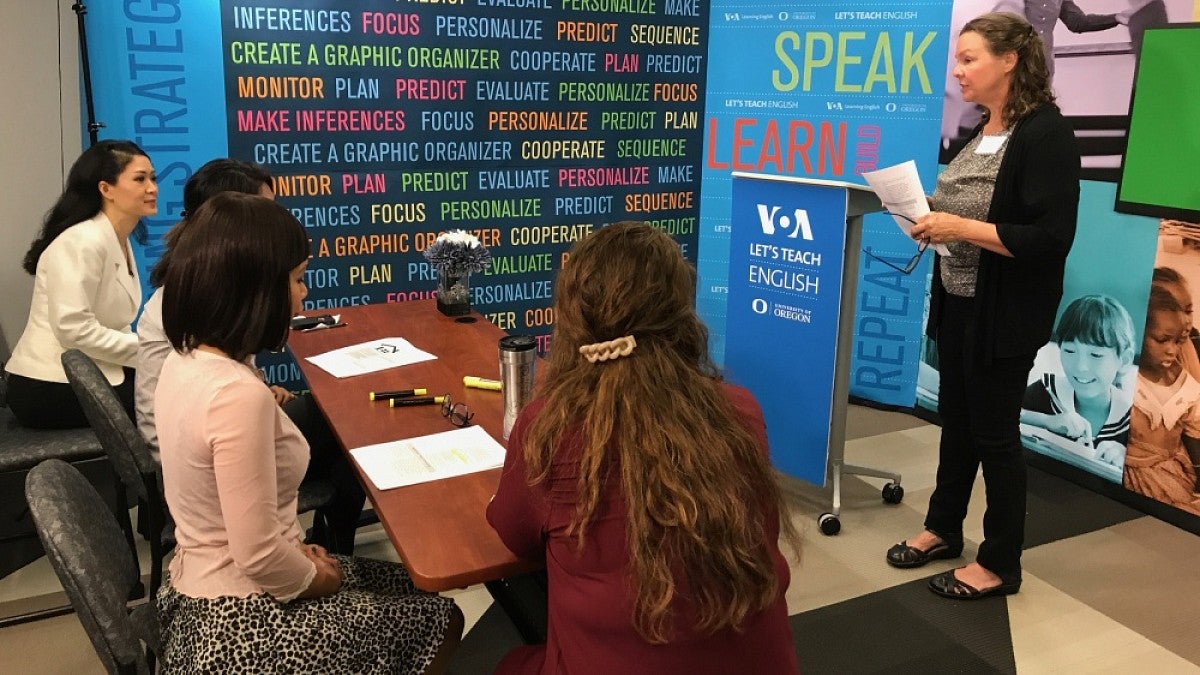The University of Oregon has forged a partnership with international news organization Voice of America to provide free online training resources to English language educators worldwide.
The new “Let’s Teach English” series will equip instructors with English language teaching skills and provide comprehensive tools for students.
“There is a lot of demand for high-quality, free language materials that can help people communicate in our increasingly globalized economy,” said Leslie Opp-Beckman, the director of innovative programming at UO’s American English Institute and one of the primary architects of the series. “There is so much value in providing open resources that can help expand educational opportunities for students around the world.”
The materials for this series are based on the “Women Teaching Women English” textbook and teacher’s manual the American English Institute developed with the U.S. Embassy in Beirut to help adult women improve their English skills. The “Women Teaching Women English” materials have been used to train English educators throughout Lebanon, including in Syrian refugee camps.
“The ‘Women Teaching Women English’ materials were produced in response to Lebanese women who wanted to improve their English skills so they could participate in more economic activities and assist their children with schoolwork,” said Opp-Beckman, a co-author of the text. “This program is about leveraging language skills as a powerful mechanism for economic empowerment.”
She suspects one of the reasons the “Women Teaching Women English” materials have been successful is because they are comprehensive and empower women in many areas beyond language acquisition. The manual weaves lessons on subjects like multiperspective thinking, critical thinking, “women at work” and “women on the move” into the reading, writing, listening and speaking components.
“The comprehensive curriculum engages women beyond language learning and helps students develop critical thinking skills and build confidence,” Opp-Beckman said.
The authors mapped out the curriculum through conversations with teachers and students about what topics they would want included in the text.
“Women can see themselves represented in this manual,” Opp-Beckman said. “They had a voice in the process and we worked hard to stay mindful of cultural relevance throughout the development of this curriculum.”
The collaboration that produced “Women Teaching Women English” is similar to many other partnerships the American English Institute has formed with government ministries, global organizations and other universities to help enrich English learning and teaching worldwide.
“I am so proud of this partnership and all of the work that comes out of the innovative programming division at the American English Institute,” said Cheryl Ernst, executive director of the American English Institute. “This group continues to elevate UO expertise onto the global stage and reflects the university’s commitment to international relationship building.”
When Voice of America discovered “Women Teaching Women English” and heard about its success in Lebanon, it decided to partner with the UO to expand it into something that could be used with a global audience.
Opp-Beckman worked closely with Voice of America to modify the manual for an international group of students while still adhering to its principles of cultural relevance. She also collaborated with the organization on instructional videos to complement the written components.
A new lesson from the series will be released weekly through November, at which point the entire series will be available online. The videos use classroom simulations to help instructors hone their teaching skills.
“The University of Oregon team ensured the quality of the final product by sharing their expertise in language teaching as well as collaborating on both the teacher and student materials,” said Jill Robbins, a linguist on the Voice of America team who helped design the video series.
“This collaboration is rooted in a shared desire to provide open educational resources to people who want them,” Opp-Beckman said. “We are thrilled to partner with Voice of America and use our collective resources and knowledge to make a positive difference for English language students and educators worldwide.”
—By Emily Halnon, University Communications


